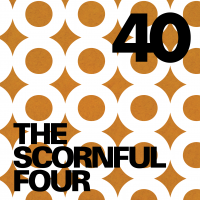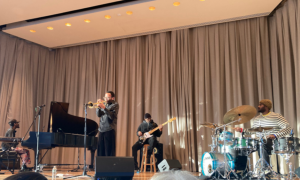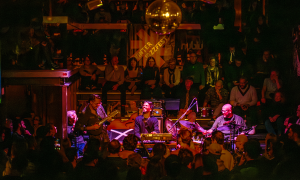Home » Jazz Articles » Live Review » European Jazz Conference 2022
European Jazz Conference 2022

Courtesy Pavel Koev / A To Z Foundation
Toplo Centrala
Sofia, Bulgaria
September 22-25, 2022
More than 300 professionals, representing 180 member organizations from 38 countries, came together in the Bulgarian capital, Sofia, for the eighth annual European Jazz Conference. The event is organized by the Europe Jazz Network, an organization founded in 1987 (full disclosure, with the help of this writer) that transformed its own General Assembly in a major forum for discussion, reflection, meetings and idea elaboration of the entire jazz movement—possibly the most globally important event of its genre. Every year several European town's jazz promoters compete with their offer to host the meeting, that includes a showcase for local musicians aimed to give them more visibility and a chance to enter the programs of the many festival and club directors participating.
The biggest Europe Jazz Conference to date, and a real organizational challenge brilliantly met by the Bulgarian team of the A to JazZ festival, created a palpable effect of community, conversation, exchange of feelings and ideas. The theme chosen was "Breaking New Ground" referring mostly to the location that brought the event to South-Eastern Europe for the first time, beyond the borders of Schengen and the Euro. The meeting started with the members-only General Assembly of EJN where the internal issues of the organization are discussed—election of its board members, and a budget that is healthy due to the support by membership but also by the European Union, not only for its own projects but also as an example of a proactive, functioning cultural network.
Keynote Speech 1
Alicja Gescinska: At Home In Music
The following day Polish-Belgian philosopher Alicja Gescinska tried to answer to the eternal question "Does music make us better?" When she had put this question to the great Polish composer Krzysztof Penderecki, the answer, despite his socially committed compositions, was a resounding no. She then examined the history of Western philosophy, retracing the notion that music plays with emotions and so can be dangerous, citing in her discussion Plato (music can play a supportive role in the perfect society but can be harmful and so censorship is needed; on the other hand, music is powerful and changes in musical tastes can entail social changes). Immanuel Kant, who in his Critique of Judgment puts poetry at the top of all the arts and music at the bottom—the least noble of all arts in matters of emotions, the most enjoyable and so the least elevating. Then Adorno declared that certain types of music are morally corrupt and corrupting, jazz in particular being the emblem of American capitalism. According to George Steiner, humanities do not humanize, and there are plenty of unfortunate examples of music lovers or practitioners with horrible or questionable personal ideas (Hitler, Stalin, Wagner, Celibidache). We do feel, however, that if the music does not make us better it does make our lives better. It can be used as an exercise in empathy (an attempt, not a guarantee) in order to learn to listen and understand others and ourselves better. In this way it was seen by Roger Scruton and Marta Nussbaum. Vladimir Jankelevitch called music "a duet of hearts" opening the possibility of sympathizing with others.Music can also be deeply linked to memories and chapters of our lives, making a negative judgment on it a deeply offensive act; music can unite people and make us relive the link to the dearly departed, reinforcing feelings of community, collective identity, belonging and solidarity, leading to understand one's own country and culture. Gescinska's conclusion was that music can have positive effects but definitely that without music, without art and without humanities barbarism is on its way.
Panel Discussion
Does Music Make People and Society Better?
The following day a panel discussion was held with Alicja Gescinska, Norwegian musician and musicologist Petter Frost Fadnes and Italian singer and artistic director Maria Pia de Vito. The debate, moderated by Misha Mengelberg and Instant Composers Pool's manager Susanna von Canon from the Netherlands, attempted to address the same themes as raised the previous day in Gescinska's keynote speech. However, the totally general discourse about an undifferentiated "music," especially in this jazz context, grew rather thin fairly quickly, leading to quite generic statements. Such a discussion could have benefitted from some input from representatives of popular music and new jazz studies, as the most interesting parts of the debate were when the participants addressed their own working and creative experiences. In the hall, the tension from the war was palpable, especially from the friends coming from the Baltic states and the subject was addressed by the Stand with Ukraine Concert with the Ukrainian duo of trumpet player Dennis Adu and Koloah (Dmytro Avksentiev) on electronic and samples, presented by Mariana Bondarenko of the Ukrainian Institute. Shades of folk tunes, movie soundtracks and natural sounds meshed in an evocative, intense set.Working Groups
The following afternoon was dedicated to five working group on different subjects, with participants dividing freely among them according to their respective interests: Leadership (Cultural operators working in jazz & improvised music); Sustainability & Ecology of the Music Ecosystem with an opening video provocation of bandleader Matthew Herbert; Fair Practice Policy, dedicated to compensation and financial relationships among promoters, musicians and agents; Business Models and Entrepreneurship, on how to operate in the business world; Gender Balance. The author took part in the session on Gender Balance and so is unable to comment on the others. This session was supposed to be about different situations in the east and west of Europe, but Mihaela Georgieva fell sick and was unable to present her communication about the Bulgarian situation where many corporations have women CEOs and where there is no gender imbalance in remunerations, so the session became basically a presentation by the brilliant Agnete Seerup of JazzDanmark on gender issues in the music sector in Norway and the Jazz Bandcamp for Girls, a project that provides an unforgettable first experience of jazz and improvisation for girls aged between 9 and 15. This program has now been successfully exported to the U.K., Poland, Sweden and Finland.The session also included an enlightening discussion about the hidden biases that we all have and that can be addressed only by beginning to acknowledge this fact. Moderated by Italian singer Maria Pia de Vito, now also director of the Bergamo jazz festival, who brought her own personal experiences, the working group discussed various experiences and the obstacles to a full representation of gender diversity in music and jazz in particular, making big bands and clubs safe places. Participants then moved outside the main building of the National Palace of Culture for the afternoon showcases, taking place in two adjacent venues, the Sofia Live Club and the DNK, conveniently located in an underground mall just in front. Well-organized and cozy, the halls provided an excellent listening experience and the showcases were the best attended of all the Europe Jazz meetings that the author has attended, The musical selections were made by an EJN commission after an open call, and were all on an excellent level.
Showcases
The Dimitar Bodurov Trio, with the leader on piano, Jens Dueppe on drums and Mihail Ivanov on bass set the tone for the whole showcase: extremely high musicianship, an original sound and strong inspiration from traditional music were apparent in the original compositions of the pianist, as was the case in all the bands that followed. And key to understanding the whole proceedings was indeed the illuminating presentation by drummer, composer and musicologist Borislav Petrov, who unraveled the complex threads of traditional village music, Ottoman-influenced folk, gypsy and urban bands and wedding bands. All of which interacted with jazz and popular music against the backdrop of political and social changes. Jazz arrived in Bulgaria around the end of the World War I, managing to survive through financial crisis, Communist prohibitions or hostility.The music developed an original language only in the Sixties. On the international jazz circuit Bulgarian artists were not especially well-known—with the exception of the composer and pianist Milcho Leviev, whose work with Art Pepper and Don Ellis left a significant mark. However, in the newly created World Music genre the ethereal dissonances of the National Radio Choir (opportunely renamed Le Mystere des Voix Bulgares) and the wild improvisations of Ivo Papasov's Wedding Band became immensely popular, inspiring artists like Stian Carstensen, Michael Brecker, Dave Douglas and Matt Darriau.
Hopefully, Petrov's multimedia presentation will be made available online, along with the final, charming musical demonstration in which Petrov reunited an all-star band of Bulgarian folk and jazz musicians to perform "Ergen Deda," a tune made famous by the Voix Bulgares choir, which exhibited all the historical incarnations of traditional Bulgarian music. It was a bit little like hearing "St. Louis Blues" in its original ragtime-inspired arrangement through classic jazz, swing, bebop and fusion styles. The impressive band included Mihail Ivanov on bass, Borislav Iliev on guitar, Dimitar Bodurov on piano, Hristina Beleva on gadulka, Zhivko Vassilev on kaval, Dimitar Lyolev on saxophone, Diana Vassileva and Asya Pincheva on vocals, with Petrov himself on drums. A pleasure to hear, and clearly making its point.
In fact, the showcases demonstrated that in order to break new ground you sometimes have to go back and dig deeper into what you thought was the old ground, which is still fertile. Bassist Vasil Hajigrudev's Sextet, the Dimitar Liolev Quartet and the Rhodopology project, were excellent examples of this. Rhythms and colors of Bulgaria's vast traditional heritage were launching pads for daring improvisations by musicians with plenty of chops and imagination. Each project featured different textures and rhythms of Bulgarian music, from wistful ballads to unbridled dance music with wild improvisations. Among the musicians, kaval specialist Zhivko Vassilev, already heard in the set that concluded Petrov's presentation, was perhaps the most impressive soloist of the showcase. He also impressed in his own band—with Dimitar Gorchakov on piano, Mihail Ivanov on double bass, Viktor Traykov on cello and Martin Hafizi on drums—and in the final set of the showcases in drummer Borislav Petrov's Jazzanitza band. In this concert, Vassilev's improvisations on the kaval over bebop-type changes conceived by Petrov channeled the spirit of Eric Dolphy.
Hristina Beleva and Vasil Hajigrudev returned to the stage with their duo of double bass and gadulka, with Beleva doubling on voice. A unique combination of sounds balanced between reinvented tradition and free improvisation, it was extremely successful and stimulated the interest of many promoters. Hopefully Beleva and Hajigrudev will reach much wider international audiences soon.
Via Mavis, a younger trio featuring the malletKAT (electronic vibraphone) of Viktor Benev, Evden Dimitrov on bass and Hafizi again on drums (yes, many musicians appeared more than once,) presented airy, dancing and cool music. The curiously named 3uP was an original concept by Antoni Donchev on piano (already heard in Rodhopology and another formidable soloist in all contexts), Rossen Zahariev on flugelhorn and percussion, and Pavel Terziyski on voice and electronics. 3uP's was exploratory music that took risks and at times created an excellent integration of lines and moods. Trombonist Gueorgui Kornazov's "New Generation" quintet with Gueorgui Stoykov on trumpet, Dimitar Blagoev on guitar, Daniele Febo on double bass and Kristian Jelev on drums was the band closest to the European Free Improvisation concept, with the growling and multiphonic trombone conjuring images of Albert Mangelsdorff and the young musicians performing at full blast simple melodies in an Albert Ayler-esque way.
Wrap-Up
Australian writer May Ngo provided the final wrap-up, remarking how the conference demonstrated the inclusivity of jazz, something that is not obviously represented in the industry at large. She also remarked upon the existence of unconscious bias(es), indicating ways to address them. The values promoted at the conference, Ngo said, included teaching empathy with music, while practicing humility in order to realize that music exists within the society; the continuous building of a community, with a feeling of a family reunion, of growing old together.Remembering John Cummings
And as in all families we mourned our losses. The most touching event of the meeting was a heartfelt tribute to London promoter John Cummings, founder of Serious and a moving force behind so many original projects of jazz all over the world, a leading personality for EJN and a splendid human being who touched the lives of all the people he worked with. With a brief speech from his wife Ginny the memorial paid homage to John and his vision. Just before the closing ceremony with the presentation of next year's European Jazz Conference in Marseille, France, Dragan Ambrozić, program manager of the Belgrade Jazz Festival for the Belgrade Dom Omladine, in an impromptu speech, thanked the EJN and the Sofia promoters for an event that will prove, in his words, historic, and that will resonate throughout the Balkans, changing the perception of the music. His words were the best comment on the incredible work of the Bulgarian team of Mila Georgieva, Petter Dimitrov and all the volunteers.Tags
Live Review
Dimitar Bodurov
Francesco Martinelli
Bulgaria
Sofia
Jens Dueppe
Mihail Ivanov
Milcho
Leviev Art Pepper Don Ellis Stian Carstensen Michael Brecker Dave Douglas Matt Darriau Eric Dolphy Albert Mangelsdorff Albert Ayler
Leviev Art Pepper Don Ellis Stian Carstensen Michael Brecker Dave Douglas Matt Darriau Eric Dolphy Albert Mangelsdorff Albert Ayler
PREVIOUS / NEXT
Support All About Jazz
 All About Jazz has been a pillar of jazz since 1995, championing it as an art form and, more importantly, supporting the musicians who make it. Our enduring commitment has made "AAJ" one of the most culturally important websites of its kind, read by hundreds of thousands of fans, musicians and industry figures every month.
All About Jazz has been a pillar of jazz since 1995, championing it as an art form and, more importantly, supporting the musicians who make it. Our enduring commitment has made "AAJ" one of the most culturally important websites of its kind, read by hundreds of thousands of fans, musicians and industry figures every month.



























